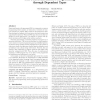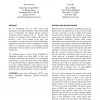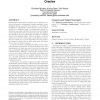123 search results - page 15 / 25 » Helping a CBR Program Know What It Knows |
IDT
2010
13 years 6 months ago
2010
Humans know how to reason based on cause and effect, but cause and effect is not enough to draw conclusions due to the problem of imperfect information and uncertainty. To resol...
ICFP
2009
ACM
14 years 8 months ago
2009
ACM
Functional Reactive Programming (FRP) is an approach to reactive programming where systems are structured as networks of functions operating on signals. FRP is based on the synchr...
CHI
1992
ACM
13 years 11 months ago
1992
ACM
We are investigating ways in which media space technologies can support distributed work groups through access to information that supports general awareness. Awareness involves k...
ATAL
2010
Springer
13 years 8 months ago
2010
Springer
One of the most challenging aspects of reasoning, planning, and acting in a multi-agent domain is reasoning about what the agents know about the knowledge of their fellows, and to...
ISSTA
2009
ACM
14 years 2 months ago
2009
ACM
Metamorphic testing has been shown to be a simple yet effective technique in addressing the quality assurance of applications that do not have test oracles, i.e., for which it is ...



